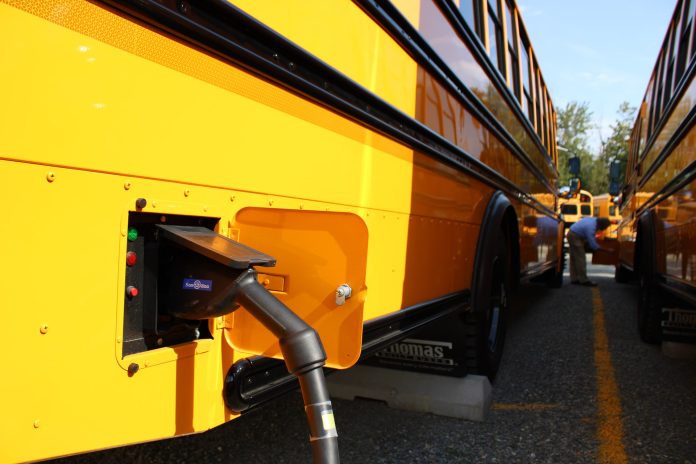Highline School District serving the Seattle suburb of Burien, Washington is in the process of replacing its aging gasoline and “clean diesel” school buses with new all-electric school buses (ESB).
To date, Highline owns three ESBs and officials report that they are running well. The district is also in the process of obtaining an additional three buses. Devin Denney, director of transportation, explained that Highline obtained the first three ESBs through the Volkswagen Mitigation Trust Fund Settlement. The next three ESBs are expected soon via Washington State Department of Ecology clean diesel grants, he added.
Highline unsuccessfully applied last year for the first round of the five-year, $5 billion U.S. Environmental Protection Agency’s Clean School Bus Program (CSBP). Denney said the district was informed that it didn’t meet the priority requirements based on low-income rural and tribal area U.S. Census data, Denney explained.
Related: EPA Announces Recipients of Clean School Bus Program Rebate Awards
The EPA selected four Washington districts to receive a total of seven ESBs. Upcoming funds for year two of the EPA CSBP are expected to be announced this spring.
In all, 87 ESBs are in operation or earmarked to be for 40 school districts and First Student, with nearly all originating from the VW or state clean diesel grants, according to the Washington State Department of Ecology.
Highline expects to receive EPA CSBP round two funding, Denney said. The district might also explore the business model offered by companies like Highland Electric Fleets, which covers the upfront cost of ESBs and all charging infrastructure, in exchange for entering a long-term contract
Construction of the battery-charging infrastructure for Highline School District’s first three ESBs is complete, but three more chargers are needed for the next three ESBs, to be purchased as soon as possible. And the district plans to acquire them one at a time.
“Since we can only purchase one bus at a time, it makes better sense to purchase and install our chargers one at a time, for each bus,” Denney shared, adding the district prefers to obtain the funding sooner and complete the purchasing program faster. “The main thing is that we need to be sure we have enough power for each new bus, so we can bring it online and integrate them into our existing system. As of now, we do have enough power and the means to charge our three EV buses, but that will change as we receive the next three.”
Otherwise, implementing the three ESBs into the fleet has gone smoothly. “That’s because we already have plenty of power at our charging site, so we haven’t experienced any challenges so far,” noted Denney. “We’ll see how it goes with the next three and so on, until we have all of them replaced with EV’s.”
In 2019, Franklin Pierce School District in nearby Tacoma was the first school district in Washington to purchase ESBs, funded by a grant developed from a 2011 agreement between the state and TransAlta to begin ceasing coal-fired operations at the Centralia power plant.
“We currently have one Blue Bird EV and it is working well on the route it’s assigned to — six schools in the mornings, and six schools in the afternoons,” said Tim Bridgeman, the district’s director of transportation. “All of our issues were small, and they have been resolved.”
With regard to infrastructure, Bridgeman said no new infrastructure was needed for the first bus.
“Our Clipper Creek 100 charger is in place, and it’s running well. Since we have six more on order, we have begun the process to upgrade our transformer and to install three fast chargers,” he shared.
Bridgeman said Franklin Pierce is very satisfied with the change from gasoline and diesel-powered buses to ESBs. “Surprisingly, it was seamless, with a small amount of training for the driver, but other than that it went smoothly,” he added.
How do the students and their parents like the new buses?
“Students like using the buses because they’re so quiet. They don’t have to talk over the engine,” Bridgeman concluded. “The driver also mentioned that it’s less stressful for him because of the difference in noise level.”
Related: British Columbia School Buses Go Electric
Related: Webinar Discusses Ways to Fund Electric School Buses
Related: Bechtel to Deliver Electric School Bus Charging Infrastructure to First Student
Related: Cummins Electrification Rebrand Promises Acceleration of Electric School Bus Production














